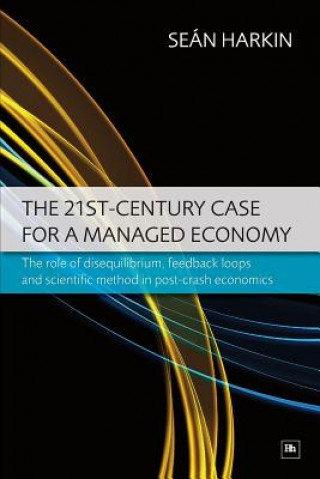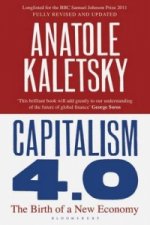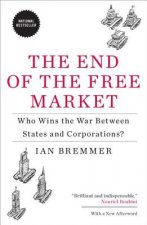
Kód: 04325908
21st Century Case for a Managed Economy
Autor Sean Harkin
This book argues that the scientific concept of feedback - the idea that change in some element of a system can cause further change in that element - represents a general concept of economic change. Positive feedback causes runaw ... celý popis
- Jazyk:
 Angličtina
Angličtina - Vazba: Brožovaná
- Počet stran: 258
Nakladatelství: Harriman House Publishing, 2010
- Více informací o knize

Mohlo by se vám také líbit
-

New History of Italian Renaissance Art
1840 Kč -

100 Years of Vintage Watches
965 Kč -

21st Century Camp Follower
928 Kč -

26th Ohio Veteran Volunteer Infantry
1087 Kč -

Internationalism, National Identities, and Study Abroad
2653 Kč -

Boundary Layer Flow over Elastic Surfaces
3280 Kč -

Rosamunde Pilcher Giftpack
914 Kč -

Cartas a mi amor
606 Kč -

Born-Jordan Quantization
1665 Kč -

Accidental Diarist
1057 Kč -

Bioaktivnost' modificirovannyh guminovyh kislot
1447 Kč -

Controlling von Produktbaukästen
943 Kč -

CD-My sme malí muzikanti- 2 CD
232 Kč -

Jo-Jo Sprachbuch - Allgemeine Ausgabe 2011 - 3. Schuljahr
363 Kč
Darujte tuto knihu ještě dnes
- Objednejte knihu a zvolte Zaslat jako dárek.
- Obratem obdržíte darovací poukaz na knihu, který můžete ihned předat obdarovanému.
- Knihu zašleme na adresu obdarovaného, o nic se nestaráte.
Více informací o knize 21st Century Case for a Managed Economy
Nákupem získáte 78 bodů
 Anotace knihy
Anotace knihy
This book argues that the scientific concept of feedback - the idea that change in some element of a system can cause further change in that element - represents a general concept of economic change. Positive feedback causes runaway change, such as a market bubble, inflation or long-run growth, while negative feedback causes stability and stasis. Emphasising both kinds of feedback stands in contrast to the equilibrium theories of classical economics which, in effect, emphasise negative feedback only. In practical terms, the feedback perspective implies a need for extensive government involvement in the economy to suppress undesirable feedback effects - such as those causing wild instability or self-perpetuating inequality - while supporting desirable feedback effects - such as those causing economic growth. -------------------- For decades, free-market economists have told a consistent story. Markets are rational, efficient, stable and fair, and even volatile financial markets should be left mostly to their own devices. The economic crisis that began in 2007 has, however, disproven such belief in the perfection of markets. The reason market fundamentalism fails is simple: it is built on economic theories that incorporate only one half of how the economy actually operates. These theories focus on a concept of long-run equilibrium that sees the economy as being continually drawn back to balance after any change from this position, in a form of what scientists would call negative feedback. However, there is also positive feedback; a process whereby a given change amplifies itself until the system is driven far from equilibrium, and this phenomenon is equally visible in the economy. Positive feedback drives economic growth, speculative bubbles, inflation, recessions, deflation and self-perpetuating inequality. It is what gives us the secular trends and cyclical fluctuations we observe in the real economy. And it deserves to be a central part of our economic theory. This book makes a first attempt at applying the concept of feedback to economic theory and economic policy. It recognises that the state must support desirable feedbacks while suppressing undesirable ones. But it also recognises that central planning leads to oppression and inefficiency. This leads us back to the common-sense idea of a mixed economic system in which the role of the state is almost as great as that of the market.
 Parametry knihy
Parametry knihy
Zařazení knihy Knihy v angličtině Economics, finance, business & management Economics Economic systems & structures
779 Kč
- Plný název: 21st Century Case for a Managed Economy
- Autor: Sean Harkin
- Jazyk:
 Angličtina
Angličtina - Vazba: Brožovaná
- Počet stran: 258
- EAN: 9781906659547
- ISBN: 1906659540
- ID: 04325908
- Nakladatelství: Harriman House Publishing
- Hmotnost: 410 g
- Rozměry: 234 × 156 × 13 mm
- Datum vydání: 12. April 2010
Oblíbené z jiného soudku
-

23 Things They Don't Tell You About Capitalism
302 Kč -

Road to Serfdom
325 Kč -

Mystery Of Capital
497 Kč -

Planning for Freedom: Let the Market System Work
310 Kč -

Origin of Capitalism
318 Kč -

Capitalism in America
410 Kč -

The Happiness Industry
323 Kč -

Enigma of Capital
276 Kč -

Entrepreneurial State
303 Kč -

Connectography
290 Kč -

Humankind
397 Kč -

Capitalism
438 Kč -

Third Pillar
808 Kč -

Poland's Return to Capitalism
1415 Kč -

Coca-Cola
395 Kč -

Cognitive Capitalism
670 Kč -

Once Upon a Time in Russia
268 Kč -

Capitalism and Modernity - The Great Debate
810 Kč -

Truth About Markets
410 Kč -

Capitalism 4.0
403 Kč -

Neoliberalism
647 Kč -

Economics for Everyone
695 Kč -

New Capitalist Manifesto
708 Kč -

From Gold to Euro
3289 Kč -

Cancer Stage of Capitalism
1125 Kč -

Capitalism without Democracy
1064 Kč -

Capitalism
940 Kč -

EU General Data Protection Regulation (GDPR)
4949 Kč -

Fair Division and Collective Welfare
1320 Kč -

Humanizing the Economy
592 Kč -

Brexit
447 Kč -

Nowa Huta
1639 Kč -

Power of Capitalism
614 Kč -

Guide to Marxian Political Economy
2357 Kč -

History of Capitalism
841 Kč -

How Ukraine Became a Market Economy and Democracy
905 Kč -

Civil Economy
779 Kč -

Six Capitals, or Can Accountants Save the Planet - Rethinking Capitalism for the Twenty-First Century
583 Kč -

Public Choice
447 Kč -

Romania
2256 Kč -

Constructing a Market Economy
2840 Kč -

End Of The Free Market
595 Kč -

State and the Economy Under Capitalism
12122 Kč -

Science of Getting Rich
504 Kč -

Planning for Freedom: Let the Market System Work
634 Kč -

23 Things They Dont Tell You About Capitalism
342 Kč -

Physical Asset Management
1749 Kč -

Rise and Fall of Czech Capitalism
3425 Kč -

Unaccountable & Ungovernable Corporation
5371 Kč
Osobní odběr Praha, Brno a 12903 dalších
Copyright ©2008-24 nejlevnejsi-knihy.cz Všechna práva vyhrazenaSoukromíCookies



 Vrácení do měsíce
Vrácení do měsíce 571 999 099 (8-15.30h)
571 999 099 (8-15.30h)